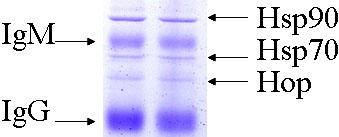HSP90AB1 Mouse Monoclonal Antibody [Clone ID: 8D3]
Other products for "HSP90AB1"
Specifications
| Product Data | |
| Clone Name | 8D3 |
| Applications | IP |
| Reactivities | Human, Mouse, Rat, Rabbit. Not tested on other species |
| Host | Mouse |
| Isotype | IgM |
| Clonality | Monoclonal |
| Immunogen | Ah receptor (Aryl hydrocarbon receptor) |
| Formulation | PBS, 50% glycerol, 0.09% sodium azide |
| Concentration | lot specific |
| Purification | PEG Purified |
| Conjugation | Unconjugated |
| Storage | Store at -20°C as received. |
| Stability | Stable for 12 months from date of receipt. |
| Gene Name | heat shock protein 90kDa alpha family class B member 1 |
| Database Link | |
| Background | Hsp90 is a highly conserved and essential stress protein that is expressed in all eukaryotic cells. From a functional perspective, hsp90 participates in the folding, assembly, maturation, and stabilization of specific proteins as an integral component of a chaperone complex . Despite its label of being a heat-shock protein, hsp90 is one of the most highly expressed proteins in unstressed cells (12% of cytosolic protein). It carries out a number of housekeeping functions including controlling the activity, turnover, and trafficking of a variety of proteins. Most of the hsp90- regulated proteins that have been discovered to date are involved in cell signaling . The number of proteins now know to interact with Hsp90 is about 100. Target proteins include the kinases v-Src, Wee1, and c-Raf, transcriptional regulators such as p53 and steroid receptors, and the polymerases of the hepatitis B virus and telomerase.5 When bound to ATP, Hsp90 interacts with co-chaperones Cdc37, p23, and an assortment of immunophilin-like proteins, forming a complex that stabilizes and protects target proteins from proteasomal degradation. In most cases, hsp90-interacting proteins have been shown to co-precipitate with hsp90 when carrying out immunoadsorption studies, and to exist in cytosolic heterocomplexes with it. In a number of cases, variations in hsp90 expression or hsp90 mutation has been shown to degrade signaling function via the protein or to impair a specific function of the protein (such as steroid binding, kinase activity) in vivo. Ansamycin antibiotics, such as geldanamycin and radicicol, inhibit hsp90 function . |
| Synonyms | D6S182; HSP84; HSP90B; HSPC2; HSPCB |
| Note | Immunoprecipitates 90kDa proteins corresponding to the molecular mass of Hsp90. Co-immunoprecipitates Hsp90 complexes, including Hsp70, Hop, Ah receptors, glucocorticoid receptors, heme-regulated eukaryotic initiation factor 2a (eIF-2a) kinase (HRI). |
| Reference Data | |
| Protein Families | Druggable Genome, Stem cell - Pluripotency |
| Protein Pathways | Antigen processing and presentation, NOD-like receptor signaling pathway, Pathways in cancer, Progesterone-mediated oocyte maturation, Prostate cancer |
Documents
| Product Manuals |
| FAQs |
{0} Product Review(s)
0 Product Review(s)
Submit review
Be the first one to submit a review
Product Citations
*Delivery time may vary from web posted schedule. Occasional delays may occur due to unforeseen
complexities in the preparation of your product. International customers may expect an additional 1-2 weeks
in shipping.






























































































































































































































































 Germany
Germany
 Japan
Japan
 United Kingdom
United Kingdom
 China
China



